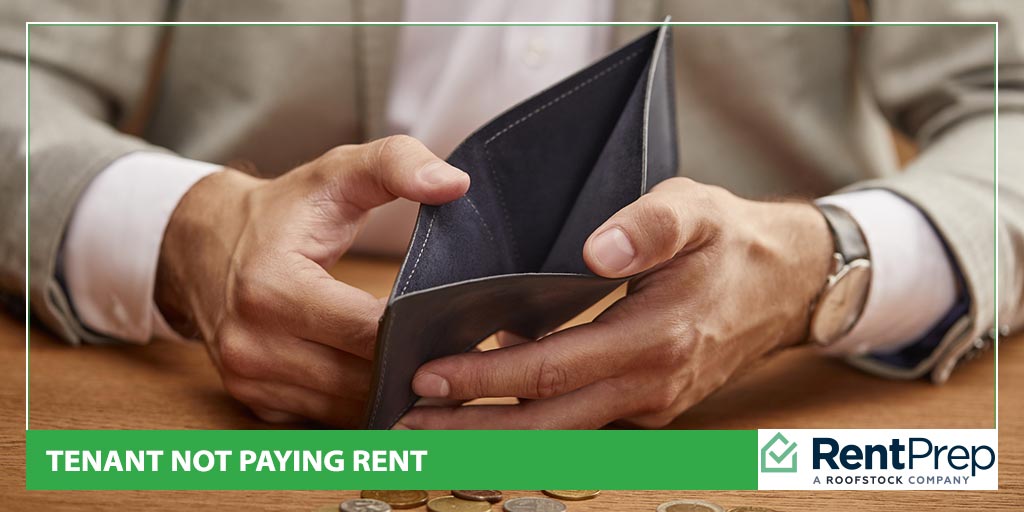
No landlord wants to deal with a tenant not paying rent, but every landlord is likely to encounter this situation at some point in their career. When a tenant doesn’t pay rent on time, it can be confusing to figure out what your next steps are.
Do you immediately move on to filing for eviction? Do you send them a notice? Do you simply call them and have a conversation about rent to see what is going on?
All of these approaches might be valid depending on the situation, and it often takes landlords a few years of experience to start knowing when to take what action. Not all landlords, however, have that kind of time to learn. Rather than waiting for years to figure out the best method of handling when a tenant is not paying rent and won’t leave, know there is a better way.
Today, learn about the best ways to handle a non-paying tenant, what you can do to collect rent, and how you should proceed in various situations. Every rental situation is unique, but there is still a general protocol you can follow.
A Table Of Contents For Tenant Not Paying Rent
- When Is Rent Considered Late?
- General Options When Rent Payment Is Late
- Situation #1: Rent Is A Few Days Late
- Situation #2: Tenant Is Late And Owes Backrent
- Situation #3: Tenant Will Not Move Out After Eviction
- Situation #4: Eviction Moratoriums
- Situation #5: My Tenant Moved Out Without Paying Rent
- Assess And Move Forward
When Is Rent Considered Late?

Before we get into the details of what to do when rent is being paid late, let’s pause to talk about when rent is considered to be late. The specifics of when rent is to be considered late are going to rely on the rental contract you have with your tenants.
In most cases, rent is due on the first day of the month, and most landlords stick to this schedule to prevent any confusion with tenants.
You should always wait to take action or charge any sort of late fees until you are certain you have confirmed the tenant is indeed late according to the lease as well as local statutes.
Grace Period
Some states have a required grace period that must be given to tenants when they are late paying rent; you can also choose to include a grace period in your lease terms.
If you decide to add a grace period to your lease, the amount of time cannot be less than what is required by your state. Usually, leases will give a three- to five-day window during which rent can be paid without any fees.
The Overall Process: What To Do When Rent Payment Is Late
Once you are certain the tenant is late, it’s time to take action. The longer you wait to address late rent payments, the less likely it is that you will be able to easily recoup the money you are owed. Moving quickly will allow you to clear up the rent issue sooner rather than later, and time truly is money in the rental business.
Note that this is the general process landlords follow when dealing with late rent. If you want to work out another plan with your tenant, that is completely up to you. That being said, it is always best to keep things on the record, in legal documents, and done by the letter of the law to avoid any complications.
Step 1: Informal Notice
The first thing you can do as a landlord is to send the tenant an informal reminder that the rent is past-due. This can be done as an email, handed to the tenant in person, put up on their door, or otherwise delivered to the tenant.
While this step is not required legally, it is a graceful way in which you, as the landlord, can give a gentle reminder to the tenant about their rent. Tenants who have simply forgotten or have never been late before will be quickly spurred into action with this type of notice.
When it comes to tenants who are chronically late, it is still good to send this courtesy notice as it creates a record of delinquent payments. That record will be useful should you ever need to file for eviction.
In this informal notice, outline the following:
- When rent was due
- How much rent is due
- What late fees will be charged
- What will happen if the tenant does not pay rent
- How to contact you with questions or concerns
Even though your tenant should know most of this information from the lease agreement, it is always good to reiterate these details. Having them in this notice to your tenant for not paying rent makes it very easy for them to play catch-up or to ask any pertinent questions.
Step 2: The Phone Call
After you’ve given the tenant informal notice, it might also be a good idea to try to get on a phone call with them to find out what is going on. Connecting on the phone can be a fast and easy way to find out if the tenant intends to pay, when they intend to pay, and what (if any) accommodations they might request from you.
You should only make one phone call to avoid any risk of harassment complaints. Calling more than once will make the tenant uncomfortable, and it won’t benefit your pursuit of collecting rent.
Step 3: Pay Or Quit Notice
This is the first step in the eviction process, and it is the next step you should take if your tenant has still not paid rent after your informal notice and phone call.
This notice must convey specific things according to state guidelines in your area, but it should generally include the following information:
- Your invent to evict the tenant if they do not pay
- How much money is owed (including all fees)
- When the money must be paid in full by
- What will happen if the money is not paid by that date
Depending on your state and local statutes, the tenant must be given a specific number of days to pay rent. Usually, they have between three and five days to pay once this notice is served.
If that time passes without any word or payment from the tenant, you can move on to file for eviction.
Step 4: Eviction

If your tenant has not paid rent by the required time for the pay or quit notice, it is time for you to move on to filing for eviction with the court system. On your own or with the help of an eviction lawyer, you can file a tenant-landlord complaint with the appropriate governing body in your area. This might be a landlord-tenant board in your city or the local civil court.
Once you have filed the necessary paperwork, the court will review the documents and contact the tenant about the filing. From there, a court date will be set, and both parties will be expected to present their case.
The judge will determine the outcome of the eviction case. If the case is decided in your favor, you will be able to evict the tenant.
Until you have that judgment in hand, however, it is illegal to try to force the tenant to leave by changing the locks or otherwise preventing them from safely accessing and living in the property. Though it can be frustrating, you must patiently wait for judgment.
To learn more about the eviction process in detail, check our complete landlord’s guide to evictions.
Situation #1: Rent Is A Few Days Late
If rent is just a few days late, your best course of action is to follow the steps outlined above. Start by sending an informal notice and making a phone call.
When can I evict a tenant for non-payment of rent if they aren’t answering my requests to pay? At that point, you can move on to send out an official pay or quit notice. If the tenant still doesn’t pay, you can move on to eviction.
At one point, your tenant may have called to tell you they will be late on rent because they recently lost their job. Check out what to do when this particular situation pops up:
Situation #2: Tenant Is Late And Owes Backrent
How long can a tenant stay without paying rent? The answer to that question in most cases is fully dependent on what you do to require payment. If you have let the tenant skip paying rent for a month or made an agreement that they will pay in increments, they may be staying at your property even if they are late and owe back rent.
It is OK to set up these situations with tenants when you feel that is the best option for all parties involved, but remember that you should always set up documentation. If the tenant does not fulfill their end of the agreement, you will still be able to move on to file for eviction and collect the rent you are owed so long as you have properly documented the agreement.
Situation #3: Tenant Will Not Move Out After Eviction
If the tenant is not paying rent and won’t leave even after you have won your eviction case, you still cannot simply force them out by changing the locks or turning off utilities. In all cases, it is illegal for you to take that action as a landlord.
Once you’ve won your case, you will be awarded a writ of possession by the court. This writ can be taken to law enforcement who will then enforce the writ and force the tenant to leave. While this takes more time than forcing the tenant out yourself, this is how it must be handled.
Tenants removed by law enforcement may leave behind belongings; you must store these items and allow them a reasonable opportunity to collect their items before disposing of or selling the items.
Situation #4: Eviction Moratoriums
There may come a time when you are dealing with a tenant not paying while an eviction moratorium is in place, such as during the COVID-19 crisis. How long can a tenant stay without paying rent when an eviction moratorium is in place?
Though it can be scary for landlords to face, the answer is that a tenant may be able to stay there for as long as the moratorium is in place. The exact answer will depend on the specific eviction moratoriums in place in your area and what the ordinances say.
There are a few commonly seen situations with eviction moratoriums:
- Tenants are still responsible for paying rent, but no evictions may be filed until the moratorium is listed. This means you cannot evict a tenant.
- Tenants are still responsible for paying rent, but evictions are being processed at a much slower pace than usual while the moratorium is in place.
- Tenants are still responsible for paying rent, but evictions are only being processed in specific cases where the health and welfare of others is involved.
As you can see, processing an eviction while an eviction moratorium is in place is very difficult, if not impossible. Regardless, forcing an eviction during this time may not be the best move in terms of reputation and future business.
What You Can Do
When faced with a situation where your tenant is not paying rent but a moratorium is in place, try taking the following actions to secure your business:
- If you won’t be able to cover mortgage payments, reach out to your lender about freeze and deferment options; explain the situation.
- If you have enough to cover payments, consider working out a solution with the tenants.
- Offer tenants one month of waived rent, if possible for your business.
- Postpone rent payments with the agreement that they will be repaid by a specific date, and get this agreement in writing.
- Temporarily reduce rent to an amount that will allow you to cover your mortgage while also making things easier on your tenant.
- See if the tenant has any other suggestions or requests that you both may be happy with.
- Research local options that offer rent payment support to your tenants or landlord funding support for landlords dealing with difficult situations.
Regardless of what solution you take in this situation, remember that you should always get things in writing. Though evictions are not being processed at the moment, there may come a time when you will need proof to recoup any lost funds. Having evidence of all conversations and agreements will be necessary.
Situation #5: My Tenant Moved Out Without Paying Rent
Sometimes, a tenant will leave without notice when they cannot pay rent. After receiving a notice to pay or quit, some tenants make the choice to leave the property altogether without paying. Other tenants will leave at the end of their lease agreement without paying the back rent that is owed. Does that mean they do not owe you any more?
No; it does not.
Even though they left the property, the tenant is still responsible for the months they were living in the property and didn’t pay. Recouping that money, however, may be very difficult.
In order to get that money back, you would need to file a suit in small claims court for the amount of money you are owed. Once you get a judgment in your favor, you would then need to actually collect that money.
Usually, this will need to be done through a collections agency or by garnishing wages directly from your former tenant’s employer. In short, it will be very complicated to deal with.
Assess And Move Forward
The key in handling a tenant not paying rent is to assess specifically what is going on in your situation before you proceed.
- How much rent is owed and when was it due?
- Has the tenant been notified about the late rent?
- Are there any external factors that prevent you from pursuing eviction, if applicable?
By answering these three questions, you will have a better idea of what you should do next. In most cases, the first step is to connect with the tenant about rent and find out what is going on with their missing payment. From there, you can determine what to do next based on your legal options.
Every situation is different, but late payments is something you should take seriously. There are some cases where making an alternative payment plan to make things easier on your tenant is reasonable, but you also need to prioritize the health of your business. Keep the well-being of both your business and your tenants in mind, and you’ll be able to make the right choices when dealing with rental non-payment issues.

